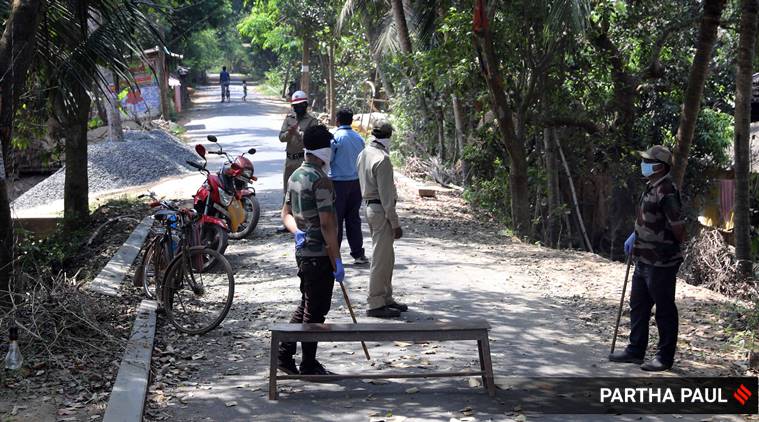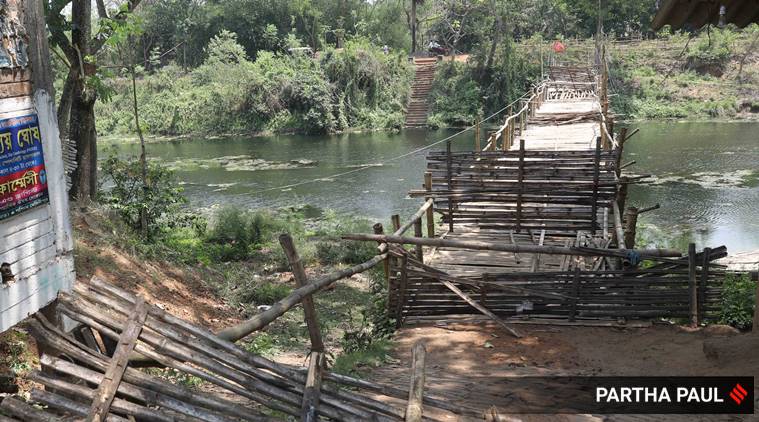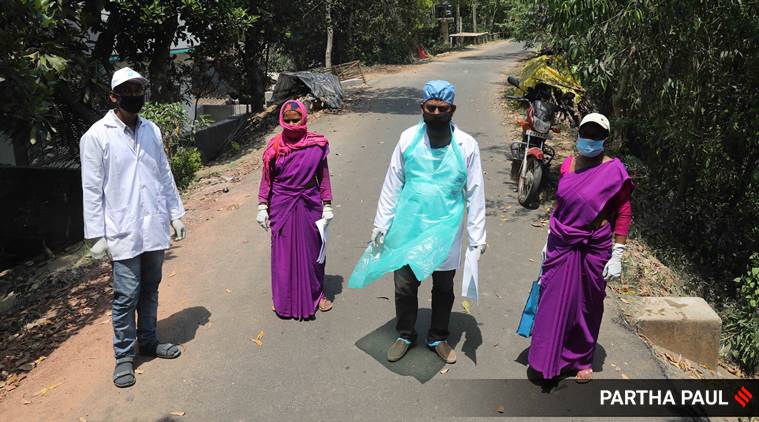 Policemen and village guards stand at the entry points of Nijampur village
Policemen and village guards stand at the entry points of Nijampur village
POLICEMEN and local guards man the entry and exit points of Nijampur, a village 130 km from Kolkata. A log and wooden benches block the breadth of the thin road that snakes its way through the village. A bamboo bridge over the Kansai tributary, the only other way out, has been severed by residents of Gobindopur across the waters.
Ever since March 31, when a goldsmith back from Mumbai and his father tested positive, Nijampur in Daspur 1 block of West Midnapore has been under quarantine. All its 250 families have been ordered indoors.
No one gets in, no one gets out. The only people visible are village resource persons and an auxiliary nurse midwife (ANM) who make a team of nine. Wearing personal protective equipment, they have been going door-to-door, looking for anyone with symptoms of COVID-19.
The youth and his father, who tested positive, are at an infectious diseases hospital in Kolkata while others in the family, and their relatives are under isolation in government hospitals.
While their shifting out did bring a wave of relief in Nijampur, that has since been overtaken by a fear of social ostracisation. Because no one wants to have any dealing with Nijampur, at least not now. Such is the fear of Nijampur that residents of adjoining villages too have locked themselves in. They call Nijampur the village of coronavirus – that’s the reason for the dismay here.
Constables and guards manning the roadhead where Nijampur ends and Parbatipur begins say they have been working in shifts 24×7 for the last three days.
“No one can enter or leave Nijampur. This is the order we have been given. There were two cases here and the village has been quarantined.
Another team makes rounds of the village to ensure everyone is at home all the time,” says Sambhunath Panda, the 22-year-old civil guard.
The bamboo bridge has been cordoned off at the Nijampur-end, and severed by Gobindopur on the other side. “Links to neighbouring villages have been cut off. You can see the bamboo bridge. My family too is scared that I do duty here. But duty is duty,” Panda says.
No one stirs out. The temple is empty and the local quack’s chamber is shut. From behind windows, faces emerge. A little later, people stand at the doors.
 The bamboo bridge has been cordoned off at the Nijampur-end, and severed by Gobindopur on the other side
The bamboo bridge has been cordoned off at the Nijampur-end, and severed by Gobindopur on the other side
“Our entire village is cut off. We cannot move out. Police and people of neighbouring villages chase us. We heard that the state government is giving 5 kg rice and flour, free, to each family from ration shops. The ration shop is in Gobindopur and we cannot leave this village. Panchayat members said they would get us the free ration, but that has not happened,” says Mithu Pramanik. A mother of two, she is very upset that Gobindopur chose to sever the bamboo bridge at its end.
Her husband Dilip Pramanik, who drives a Toto, an e-rickshaw, says he sneaked out to get to a grocer in Parbatipur. “The policemen and residents of the village chased me. They said they will not let me enter their village. I had to run back home. We need groceries, we have run out of essentials. There’s no cooking oil left.”
Others like Manik Pramanik, a farmer who is also the secretary of the Unnayan Committee (village development committee), try to help people in the village by sharing what they have.
“I have two cows which give 7-8 litres of milk daily. I share it with others in the village. There are vegetables in our fields, but most households have run out of rice, flour and potatoes. We also need medicines,” he says.
 Village resource person and village health workers visiting at Nijampur village
Village resource person and village health workers visiting at Nijampur village
Quarantine means Nijampur cannot take its produce to the market. Most farmers grow vegetables in small plots, and have to ensure these perishable goods sell early.
“I have a daily yield of cucumbers. I have been calling traders in Timohini market, just about a kilometre away. They say they will not accept vegetables from our village. My produce lies in the field and will soon rot. Even if this quarantine ends, the stigma will remain. Who will buy our vegetables,” says Ajit Pramanik.
Families in the village have told their sons, who works as goldsmiths or flower decorators in the big cities of Mumbai, Delhi, Hyderabad and Ahmedabad, not to return even after the lockdown ends.
On Friday, 27-year-old Sisir Majhi, suffering from kidney failure, was unable to reach the town of Ghatal for dialysis. “My condition is not good. Every week, I have to undergo dialysis twice. In the morning, I got a call from the hospital in Ghatal. The person said since the virus is now in our village, the dialysis will not happen.”
When The Sunday Express contacted health officials, an ambulance arrived Saturday to take Majhi to the hospital in Ghatal where the dialysis was done.
The team of health workers on the ground have a Herculean task on hand. They are going door-to-door daily. Sheikh Latifuddin, one of the village resource persons, says: “In each household, we are checking for any kind of ailment, especially fever, cough or respiratory problems which are symptoms of COVID 19. This is being done every day. We are a nine-member team now. I have requested for two more persons.”
Opinion | P Chidambaram writes: Now, everyone is in prison
 Policemen and village guards stand Timohoni steel bridge entry point and about a km away from Nijampur village
Policemen and village guards stand Timohoni steel bridge entry point and about a km away from Nijampur village
Mamoni Jana Ghorui (30), the secondary ANM who rides a cycle to do the daily rounds, says, “We know each family here. So even if they hide any symptom, we will find out. If they have other health problems, we try to help them. We have also distributed handbills on precautions that need to be taken against COVID-19.”
Kamal Krishna Samanta, pradhan of Nandanpur 1 gram panchayat which includes Nijampur, says, “Two persons have tested positive. We are aware that ration and groceries are yet to reach Nijampur. We will soon get ration from the shop at Gobindopur and transport it to the village. Earlier, there was a problem because people in Gobindopur protested. But it has been resolved. We have decided that civic police members will go door-to-door in PPE and take lists of groceries from each household. We will deliver the groceries at the doorstep. We are taking all care possible.”